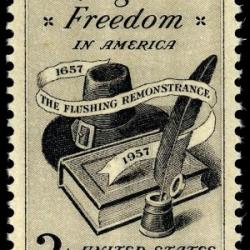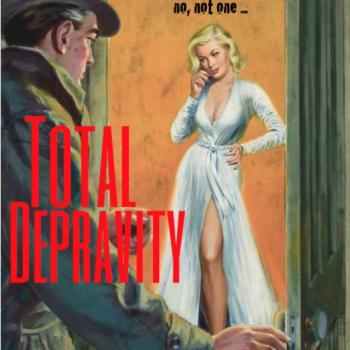Here’s Sarah Posner on the unintentionally revealing invocation of St. Thomas More as the U.S. bishops’ symbol of “religious liberty”:
Invoking More as a symbol of religious freedom is highly problematic, for some of the Bishops’ evangelical allies, but especially for how citizens understand our democracy.
More, politician, philosopher, counselor to King Henry VIII and later his Lord Chancellor, opposed the Reformation — not just Martin Luther, not just Henry’s efforts to secure a divorce from Rome, but the contemporaneous efforts of William Tyndale to publish and distribute an English translation of the Bible in England. His pursued Tyndale with an inquisitorial zeal, and Tyndale eventually was burned at the stake.
… The United States government, unlike Henry’s England, is not under the religious authority of Rome, or any religious body, for that matter. (That’s in the Constitution, last time I checked.) Through the contraception mandate, or any other duly enacted law or regulation, such as the repeal of Don’t Ask Don’t Tell, the United States government is not flouting religious authority. That’s because it doesn’t answer to religious authority.
And more from Ed Kilgore:
St. Thomas More, despite the highly attractive reputation he has for Americans of every or no faith via Robert Bolt’s 1954 play A Man For All Seasons (subsequently made into a 1966 film that won six Oscars), was not exactly an apostle of religious liberty or freedom of conscience. As Henry’s chancellor, he was a very enthusiastic torturer and persecutor of “heretics,” particularly anyone bearing the virus of continental evangelical Protestantism. He was especially renowned for his relentless efforts to secure the execution of William Tyndale, the great evangelical Bible translator, succeeding (according to most accounts) in having Tyndale burned at the stake near Brussels. So far as I am aware, More never recanted of any of these acts; he went to his beheading for what he perceived as orthodoxy, not religious liberty.
Defenders of what they perceive as orthodoxy, not of religious liberty. Exactly.
The U.S. Catholic bishops have every right to defend what they perceive as orthodoxy in their churches and throughout all the realms ruled over from their holy thrones. But they have no right at all to seek to enforce what they perceive as orthodoxy through the courts of the United States. Their attempt to do so is unjust and thus, however distorted their perceptions of “orthodoxy,” not merely illegal and unconstitutional, but — like St. Thomas More’s torture of those he deemed heretics — a sin.
* * * * * * * * *
In other religious liberty news, a federal judge has ordered the Sussex County (Del.) Council to stop abusing Christianity and the Gospels.
The council — in traditional Sussex County fashion — likes to use the trappings of religion to make itself appear pious. But apparently it wasn’t enough for the council just to misuse the Lord’s Prayer as a political fashion accessory — they wanted to go even further, claiming that the words of that prayer are meaningless.
“Our Father,” the prayer famously begins. And the Sussex County Council dismisses its meaning starting with that very first word. They claimed that this prayer — quoted from the Christian Gospels — was not sectarian. Who is the we in that “our”? It doesn’t matter, says the Sussex council, albeit disingenuously. It could be anyone.
“Thy kingdom come, thy will be done,” the prayer continues. To whom does that word “thy” refer? Again, the Sussex County Council says it doesn’t matter. It could be anyone. Or everyone. Or no one. It’s not a sectarian prayer, they say. It’s not actually The Lord’s Prayer, just, you know A Lord’s Prayer. Any Lord, apparently. Or no Lord. No particular, sectarian Lord, anyway.
Happily, a federal judge viewed things differently. This prayer from the Christian Bible and to the Christian God, the judge said, is a Christian prayer.
The fact that The Lord’s Prayer has been the only prayer recited at the beginning of Council meetings for over six years is likely to be found to demonstrate that the Council gives Christianity an unconstitutionally preferred status, sending a message to meeting attendees that the Council is promoting the beliefs of Christianity.
Yeah, the judge is probably right in guessing that the council views itself as “promoting the beliefs of Christianity.” But when this is how they go about promoting Christianity — by enforcing it through political power and equating it with political power — then there’s really no difference between promoting it and attacking it.












